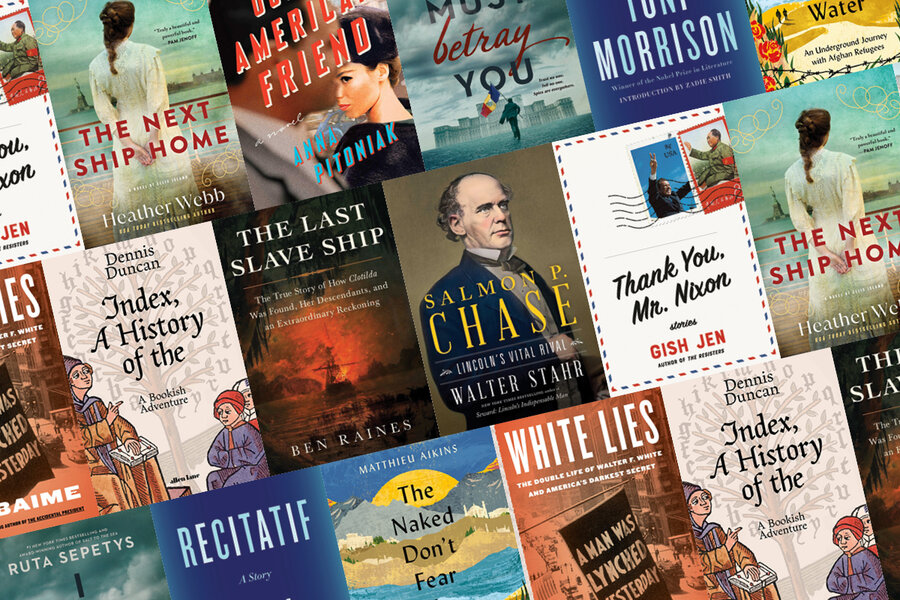Tales of courage and grit lead the 10 best books of February
Loading...
“Being deeply loved by someone gives you strength, while loving someone deeply gives you courage,” wrote Chinese philosopher Laozi in sixth century B.C. His words ring true for many of the protagonists in the books recommended by our reviewers this month.
Among these stories, a teenage boy faces down authoritarian rule by building trust, a Western journalist accompanies his Afghan friend into exile as a refugee, and a Black civil rights worker exposes lynching in the American South.
Not every title deals with a heavy topic. There is humor and pathos, grit and resolve, to be found as well. A nonfiction writer explores the humble index as a tool of organization and delves into how humans create meaning. And a biography sheds fresh light on a key member of President Abraham Lincoln’s Cabinet.
Why We Wrote This
Tales of courage and liberation are threaded through our reviewers’ picks for the 10 best books of February – including escapes from coercion in Romania and from the advancing Taliban in Afghanistan.
February’s books tackle wide-ranging themes, from escaping authoritarian regimes and racial preconceptions to discovering a sunken piece of slavery’s past and a history of the humble index.
1. Thank You, Mr. Nixon by Gish Jen
Gish Jen’s short story collection begins with a Chinese saying: “A long journey begins with a step.” Readers could add, gratefully: “And ends with a story.” There are 11 here – starting with President Richard Nixon’s visit to China in the 1970s and progressing to the pandemic-shaped present. With humor and pathos, the stories feature mainland, immigrant, and Hong Kong characters confronting cultural and political changes. (Find the full review here.)
Why We Wrote This
Tales of courage and liberation are threaded through our reviewers’ picks for the 10 best books of February – including escapes from coercion in Romania and from the advancing Taliban in Afghanistan.
2. The Next Ship Home by Heather Webb
Heather Webb’s novel tells the story of two young women brought together in 1902 at Ellis Island. The briskly moving tale, interspersed with newspaper articles of the period, illuminates corruption at the immigration facility while underscoring the grit and resolve of New York City’s newcomers.
3. Our American Friend by Anna Pitoniak
“When you become a stranger to your past self, what do you call that?” wonders Moscow-born Lara Caine. As the first lady of the United States, the mysterious former model narrates her story to biographer Sofie Morse. Anna Pitoniak’s page-turner considers the costs and consequences of truth-telling during the Cold War and in the fraught political present.
4. I Must Betray You by Ruta Sepetys
“Trust no one,” whispers Cristian Florescu’s beloved grandfather; they’re words to survive by in the fear-fueled Romania of 1989. In her deft portrayal of a teenager turned reluctant informer, Ruta Sepetys makes the case that trust, coupled with selfless courage, is the key to cracking autocratic rule. A well-researched nail-biter, the novel transcends its young adult genre.
5. Recitatif by Toni Morrison
Toni Morrison’s only short story, “Recitatif,” written in 1980, is a brilliant, provocative experiment that tests readers’ deep-seated racial preconceptions. It’s about two poor girls who room together in a state shelter when they’re eight, and then run into each other years later. One girl is white, the other Black, but Morrison deliberately, masterfully obfuscates which is which. (Find the full review here.)
6. The Naked Don’t Fear the Water by Matthieu Aikins
As the war in Afghanistan winds down, a young Afghan translator who worked with U.S. forces flees the country as a refugee. Rather than let him travel alone, his close friend, a Western journalist, hides his own passport and sets out with the translator on the perilous journey. It’s a gripping true story of courage, fear, danger, and compassion.
7. White Lies by A.J. Baime
A.J. Baime writes a groundbreaking biography of American civil rights leader Walter White, who literally led a double life: as a Black man giving shape to both the Harlem Renaissance and the NAACP, and as a white man writing searing journalistic pieces about the evils of lynching and the plight of Black men in the South.
8. Index, A History of the by Dennis Duncan
Dennis Duncan leads an erudite and entertaining tour of a topic you’ve probably given little thought to, tracing the index from its roots in the ancient world to medieval Europe and up to the computer age. The book is brimming with fun facts but also makes deeper points about how humans create meaning.
9. The Last Slave Ship by Ben Raines
Ben Raines made headlines in 2019 when he discovered the remains of the Clotilda, the last ship to bring enslaved people to America. His gripping, affecting book chronicles his search for the vessel in the swamps of Alabama and tells the stories of its captives and their descendants.
10. Salmon P. Chase by Walter Stahr
In this revelatory reassessment of Abraham Lincoln’s secretary of the treasury, Walter Stahr presents readers with a far more textured and complicated Salmon P. Chase than in previous biographies, showing him as a shrewd figure who fought a long battle for a variety of progressive causes, including defending those who escaped slavery in court.







